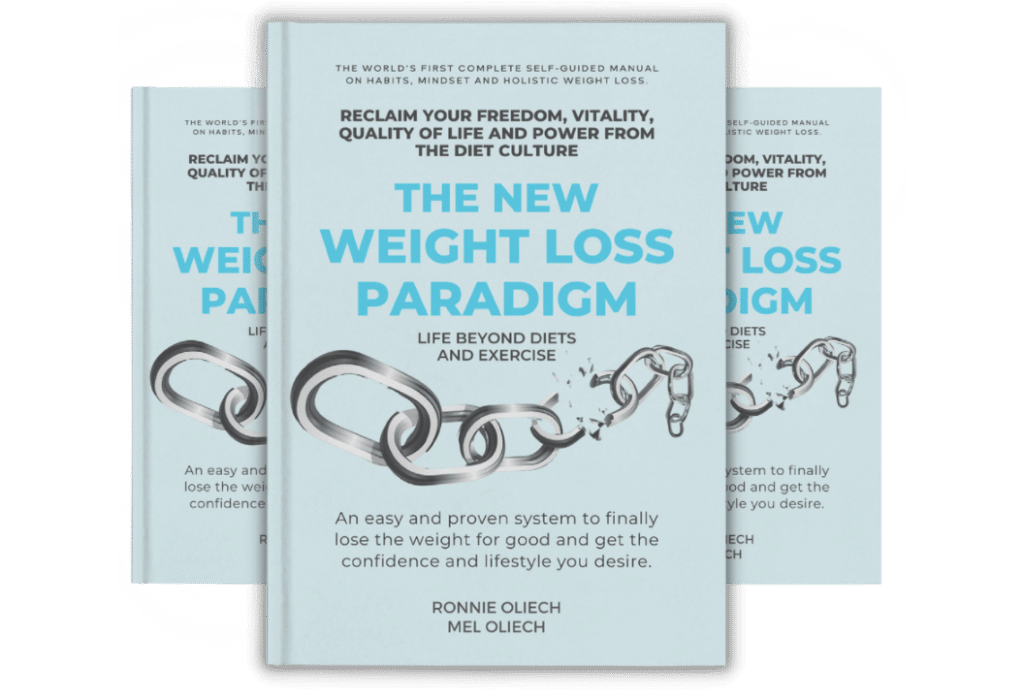If you’re ready to embark on a body and lifestyle transformation program, you probably want to know how long it will take to get results, right?
This is a very common question we get asked, especially if someone has been a chronic dieter and is used to losing weight in 6 or 12 weeks, (even if they don’t manage to keep the weight off!).
But the question we’d like to ask is why are you putting a timeline on your weight loss anyway?
The diet industry has been lying to you
The diet industry feeds you many lies. One of these lies is that you can lose a significant amount of weight in a relatively short time, if you only follow the rules.
Many people who have embarked on diets did follow the rules (often through sheer willpower and deprivation), and experienced initial weight loss. But soon enough, results slowed down or stalled completely, because diets just don’t work. Instead of the diet industry taking responsibility for selling you their faulty product, it tells you that you’re to blame for not losing weight, because you haven’t followed the plan closely enough. To ram home their point, they also show you ‘before’ and ‘after’ photos of people who stuck to the program and lost weight, yet conveniently leave out the fact that 98% of all people who go on diets end up gaining back what they lost, plus more.
Many people who have embarked on diets did follow the rules (often through sheer willpower and deprivation), and experienced initial weight loss. But soon enough, results slowed down or stalled completely, because diets just don’t work. Instead of the diet industry taking responsibility for selling you their faulty product, it tells you that you’re to blame for not losing weight, because you haven’t followed the plan closely enough. To ram home their point, they also show you ‘before’ and ‘after’ photos of people who stuck to the program and lost weight, yet conveniently leave out the fact that 98% of all people who go on diets end up gaining back what they lost, plus more.
So how long will it really take? Well, to answer that, we first need to look at the variables that impact weight loss.
Dieting history
This is a really important consideration when it comes to weight loss. While the dieting industry would have you believe that you can lose weight quickly by going on the latest diet, this is not true. The truth is the longer you’ve dieted and the more diets you’ve been on, the longer it will take for you to lose weight and be able to keep it off.
One of the reasons for this is a compromised metabolism. While restricting food and calories (a key component of dieting) does create a calorie deficit, creating too much of a deficit can lead to weight gain and a slower metabolism. Of course, diets are never sustainable so when dieters fall off the wagon and go back to their old habits, they gain weight. A slower metabolism also contributes to this weight gain, which helps explain why many people gain more weight than they lost when coming off a diet. The more diets you’ve done, the more you compromise your metabolism, and the harder it becomes to lose weight. The good news is, that with our Diet Antidote Transformation Program (DATPTM), we can re-program your metabolism and get it firing again so you can have a body that burns fat.
The other major problem with diets is how they brainwash people into believing and thinking certain ways about food, exercise and what it really takes to lose weight. This can be summed up by the term ‘diet mindset’. And once again, the longer you’ve dieted for, the stronger your diet mindset will be.
The diet mindset
Most people who want to lose weight have a diet mindset. The diet mindset is one that has developed as a result of following diets, and the lies the diet industry spins. It’s a complex mindset that is strongly linked to low self-esteem, lack of flexibility and deprivation. Someone with a diet mindset will struggle to lose weight because they will approach any program they undertake — even a holistic program like a body and lifestyle transformation program — like a diet.
Typical behaviours of someone with a diet mindset include:
- Restricting food and then bingeing
- Trying to be perfect
- Feeling guilty about eating ‘bad’ foods
- Focusing on the scales instead of how their body feels and functions
- Having difficulty resting
- Being afraid to make a mistake
- Placing their value in a clothing size or a scale weight
- Jumping from one diet to another
- Procrastinating
- Worrying about what other people think of them.
This causes a lot of turmoil which results in the need to feel in control, along with high levels of stress, which is a known cause of weight gain, and an inability to lose weight. Until someone overcomes the diet mindset, long-term weight loss will be difficult. To fully understand the thoughts and behaviours that are attached to the diet mindset and how you can overcome it, read our blog Change your mindset to lose weight fast.
Muscle mass and training
The biggest influence on your metabolism is the amount of muscle mass you have. Around 66% of your metabolism is influenced by your muscle mass, which means the more muscle you have, the faster your metabolism will be. Muscle tissue also burns fat, so the more muscle you have, the more fat you’ll burn. Unfortunately, we lose muscle as we get older which means our metabolism also slows down. However, by introducing Focused Intense Resistance Exercise (FIRE) to your training program, you can build your muscle mass, increase your metabolism, and increase your body’s ability to burn fat.
The time involved in getting a body transformation result will be influenced by your muscle mass, and the type of exercise you’ve been doing. If you’ve been primarily focusing on cardio exercise to lose weight, it will take you longer to get a result than someone who has been following a structured, progressive weight training program. It’s also important to perform the right amount of exercise. When it comes to weight loss, less is often more. Too much exercise can lead to injury and burnout, as well as putting too much stress on your body. So the more you focus on the exercise that will give you the biggest bang for your buck, the quicker you’ll lose weight.
Our blog Training and Exercise: What’s the best workout routine? explains in more detail the type of training program that yields the best results and why.
Metabolic Blockers
Stress levels
As we mentioned above, stress levels play a huge part in our ability to lose weight and achieve a body transformation result. Stress and weight gain are linked for several reasons. The first is the release of hormone, cortisol that occurs when you’re stressed. This hormone increases your appetite, cravings for junk food and makes it easier to gain weight around your belly. Stress also increases the likelihood of emotional eating, drinking too much alcohol, and plays havoc with your sleep. Stress management therefore is key. The less stress someone has in their life, the quicker it will take to get a result.
Sleep habits
Sleep has a huge impact on our weight and our ability to change our body shape. Poor sleep is linked to weight gain, increased stress, lower metabolism, and an increased craving for unhealthy foods. Inadequate sleep will also mean we won’t be able to perform as well during our workouts, or recover after them, which can increase the chances of burnout and injury, and make it more difficult for us to stay consistent with your weight loss. It therefore follows that the better sleep habits someone has, the quicker their results will take.
Alcohol consumption
Drinking too much alcohol can also sabotage weight loss. This is not just because of the extra calories consumed, but the effects that alcohol has on weight. It increases hunger levels, makes you more likely to make poorer food choices, leads to poor digestion and nutrient uptake, reduces the likelihood that you’ll get to your next training session, reduces muscle growth, increases fat accumulation and prevents your body from burning fat. It also hinders your recovery from your workouts. Those who drink alcohol regularly, or drink large quantities of alcohol are more likely to struggle to lose weight. However, someone who isn’t a big drinker will get their results quicker.
Drugs and medication
Unfortunately, some drugs and medication can also interfere with your weight loss. While we would never recommend you stop taking medications that have been prescribed by your doctor, it’s important to be aware that these may have some impact. However, taking medications doesn’t mean that weight loss is impossible. In fact, medication is only a very small piece of the weight loss puzzle.
Habits
Eating habits
Eating habits and relationship with food will also impact how long it will take to get a body transformation result. For example, someone who restricts food and follows food rules is more likely to binge than someone who allows themselves to enjoy their favourite foods. This bingeing and restriction leads to weight gain, and increased levels of stress.
Even if you’re eating well most of the time, you’ll struggle to lose weight if you don’t eat enough food. It’s very common for people who have dieted for years, to be afraid of eating food. However, limiting portions and skimping on your food will backfire and lead to a slower metabolism and weight gain. In addition, people who eat well most of the time, allow themselves treat foods, but feel guilty about it will also take longer to lose weight, because the guilt involved in eating these foods leads to higher stress levels. It also increases the likelihood that they will ‘make up’ for eating these foods by restricting their other meals or even fasting. Therefore, the better relationship you have with food, the quicker you’ll experience results.
Other habits and mindsets
All of us have habits that make it harder to lose weight. The more of these habits we have, the longer it will take to lose weight and keep it off. Despite what the diet industry tells you, successful weight loss isn’t found in focusing on your diet and exercise. It’s found in changing your habits and developing new ones that will make it easier to lose weight for good.
Some of the most common habits that will make it harder to lose weight include:
- Being a perfectionist
- Low self-worth
- Comparing yourself to others
- Worrying about what other people think
- Lack of confidence
- Procrastination
- Self-entitlement
- Living in fear
- Not celebrating your success
- Shame and embarrassment
- People-pleasing.
Changing habits is difficult but it can be done. The best way to do it is to work with a coach who can help you identify the habits that are making it hard for you to lose weight, and then give you a personalised, structured plan that will help you change your habits. Because only when you change your habits will you succeed at weight loss, and get the transformation result you’re looking for.
Your WHY
Why do you want to lose weight?
Having a deep, personal reason for doing so will help you going during the tough times. Because if you know your why, you’ll find your how. In other words, if you know why it’s important to you, you’ll always find a way to do the things you need to do, in order to lose weight.
Those people who have a WHY, are the ones who will lose weight the fastest.
Your commitment
Even if you have a strong WHY, you need to be ready and willing to put in the work to get your results. Results don’t happen overnight. Nor do they happen in 6 or 12 weeks. At Imani Tribe Transformations, we require our clients to work with us for a minimum of 12 months in order for them to have enough time to achieve long-lasting change.
The process of transformation isn’t linear and isn’t always smooth. There will be hurdles and challenges, and there will be times when you want to give up because you’ll feel nothing is changing. This is a normal part of the process. How willing you are to persevere during these tough times and confront your fears will influence how quickly you’ll get your results.
To fully understand what’s involved in a transformation journey, make sure you read our blogs The seasons of transformation and The stages of transformation.
Structure and accountability
The final variables that will help determine how quickly you achieve results is structure and accountability.
Weight loss doesn’t happen by accident. It’s a result of following a plan. Not a meal plan or exercise plan, but a personalised plan designed to help you reach the goals that are important to you. Following a structured plan might sound like hard work, but it actually makes the process easier. It reduces stress and frees up time for you to do the things that will help you lose weight, while still allowing you the time to do the things you love. A structured plan makes time for workouts, planning and preparing healthy meals, getting enough sleep, going to work or running your business, raising your kids, catching up with friends and enjoying your down time.
Accountability is the glue that holds your transformation together and it’s what will get you results. But if you’re not willing to be fully accountable, you’ll always struggle.
Being accountable means taking responsibility for your actions and being answerable for your actions. It means doing what you need to do, not what you choose to do. It also means:
- Making a commitment to yourself and your coach, and seeing it through
- Being willing to do what it takes to get your results
- Doing the tasks you’ve been asked to do and letting your coach know when you’ve done it
- Communicating openly and honestly, especially about your struggles
- Having difficult conversations without taking things personally
- Taking constructive feedback and using it to improve or change something
- Trusting your coaches even if you don’t understand why they’re asking you to do something.
Forget the timeline
As we’ve seen there are a lot of variables that influence how long it will take to get the results you’re looking for. There is no hard and fast rule about how long it will take because everyone is different and everyone has different things they need to work on. The best approach is to forget about the timeline and focus on the journey instead. Because when you do, you’ll actually get your results faster than you would, if you focus on where you want to get to.
To fully understand how focusing on a timeline will sabotage your results, read our blog Is your weight loss timeline sabotaging your success?
If you’re ready to focus on the actions steps required to lose weight and change your life, we’re ready to help.
Through our Diet Antidote Transformation System (DATS™️) — the Not-diet diet for people who are sick of diets and want more than a good body — we can provide you with the structure and accountability you need to help you reach your weight loss goals.
Through our program we will give you specific, personalised action steps to help you change your habits and mindset, along with advice on nutrition and exercise. This will enable you to address the factors that influence your weight, so you can ensure they work for you, instead of against you.
DATSTM will give you the knowledge, systems, tools and skills to help you deal with any situation, so you can finally ditch the diets and lose weight, without going around in circles.


















